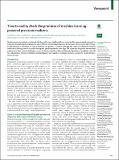Files in this item
Time to reality check the promises of machine learning-powered precision medicine
Item metadata
| dc.contributor.author | Wilkinson, Jack | |
| dc.contributor.author | Arnold, Kellyn F | |
| dc.contributor.author | Murray, Eleanor J | |
| dc.contributor.author | van Smeden, Maarten | |
| dc.contributor.author | Carr, Kareem | |
| dc.contributor.author | Sippy, Rachel | |
| dc.contributor.author | de Kamps, Marc | |
| dc.contributor.author | Beam, Andrew | |
| dc.contributor.author | Konigorski, Stefan | |
| dc.contributor.author | Lippert, Christoph | |
| dc.contributor.author | Gilthorpe, Mark S | |
| dc.contributor.author | Tennant, Peter W G | |
| dc.date.accessioned | 2022-01-19T17:30:40Z | |
| dc.date.available | 2022-01-19T17:30:40Z | |
| dc.date.issued | 2020-12 | |
| dc.identifier | 277522931 | |
| dc.identifier | 6fb228eb-d6d7-4fd8-bcd7-11fa05e873bc | |
| dc.identifier | 33328030 | |
| dc.identifier | 85096916889 | |
| dc.identifier.citation | Wilkinson , J , Arnold , K F , Murray , E J , van Smeden , M , Carr , K , Sippy , R , de Kamps , M , Beam , A , Konigorski , S , Lippert , C , Gilthorpe , M S & Tennant , P W G 2020 , ' Time to reality check the promises of machine learning-powered precision medicine ' , The Lancet Digital Health , vol. 2 , no. 12 , pp. e677-e680 . https://doi.org/10.1016/S2589-7500(20)30200-4 | en |
| dc.identifier.issn | 2589-7500 | |
| dc.identifier.other | ORCID: /0000-0003-3617-2093/work/106838518 | |
| dc.identifier.uri | https://hdl.handle.net/10023/24710 | |
| dc.description | JW is supported by a Wellcome Institutional Strategic Support Fund award (204796/Z/16/Z). MSG and PWGT are supported by The Alan Turing Institute (EP/N510129/1). CL is supported by the German Federal Ministry of Education and Research in the project KI-LAB-ITSE (project number 01|S19066). | en |
| dc.description.abstract | Machine learning methods, combined with large electronic health databases, could enable a personalised approach to medicine through improved diagnosis and prediction of individual responses to therapies. If successful, this strategy would represent a revolution in clinical research and practice. However, although the vision of individually tailored medicine is alluring, there is a need to distinguish genuine potential from hype. We argue that the goal of personalised medical care faces serious challenges, many of which cannot be addressed through algorithmic complexity, and call for collaboration between traditional methodologists and experts in medical machine learning to avoid extensive research waste. | |
| dc.format.extent | 4 | |
| dc.format.extent | 95425 | |
| dc.language.iso | eng | |
| dc.relation.ispartof | The Lancet Digital Health | en |
| dc.subject | Delivery of Health Care/methods | en |
| dc.subject | Humans | en |
| dc.subject | Machine Learning | en |
| dc.subject | Precision Medicine/methods | en |
| dc.subject | QA76 Computer software | en |
| dc.subject | RM Therapeutics. Pharmacology | en |
| dc.subject | ZA4450 Databases | en |
| dc.subject.lcc | QA76 | en |
| dc.subject.lcc | RM | en |
| dc.subject.lcc | ZA4450 | en |
| dc.title | Time to reality check the promises of machine learning-powered precision medicine | en |
| dc.type | Journal item | en |
| dc.contributor.institution | University of St Andrews. Statistics | en |
| dc.identifier.doi | 10.1016/S2589-7500(20)30200-4 | |
| dc.description.status | Peer reviewed | en |
This item appears in the following Collection(s)
Items in the St Andrews Research Repository are protected by copyright, with all rights reserved, unless otherwise indicated.

